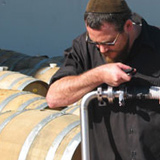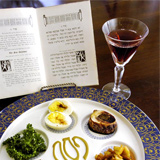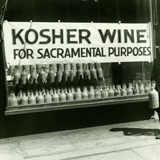Kosher wine (Hebrew - yayin kasher) is wine produced according to Judaism's religious law, specifically, the Jewish dietary laws (kashrut) regarding wine. However, some non-Orthodox branches of Judaism may be more 'relaxed'. When kosher wine is produced and sold to Orthodox Jews, it must have the hechsher (seal of approval) of a supervising authority (e.g. the 'OU' sign of the Orthodox Union), or of an authoritative rabbi who is preferably also a posek ('decisor' of Jewish law) or be supervised by a beth din (Jewish religious court of law) according to Orthodox Judaism. In general, kashrut deals with avoiding specific forbidden foods, none of which are normally used in winemaking, so it might seem that all wines are automatically 'kosher'.
Recently there has been a demand for kosher wines and a number of wine countries now produce a variety of kosher wines under strict rabbinical supervision; Israel, USA, France, Germany, Italy, South Africa, and Australia.
The use of wine has a long history in Judaism, dating back to biblical times. Evidence shows that wine was produced throughout Israel until at least 636 AD when the area came under Muslim control which prohibited alcohol.
While none of the ingredients that make up wine (alcohol, sugars, acidity and phenols) are considered non-kosher, the kashrut laws involving wine are concerned more with who handles the wine and what they use to make it. To be considered kosher, a Sabbath-observant Jew has to be involved in the entire winemaking process from the harvesting, through fermentation to bottling.
Any ingredients used, including fining agents, need to be kosher. This requirement can exclude certain fining agents such as casein (derived from dairy), gelatin (from non-kosher animals) and isinglass (from non-kosher fish). Egg whites can be used in the clarification of kosher wine but would not be appropriate for Vegan kosher wine. Wine that is described as kosher for 'Passover' must have been kept free from contact with grain, bread and dough.











